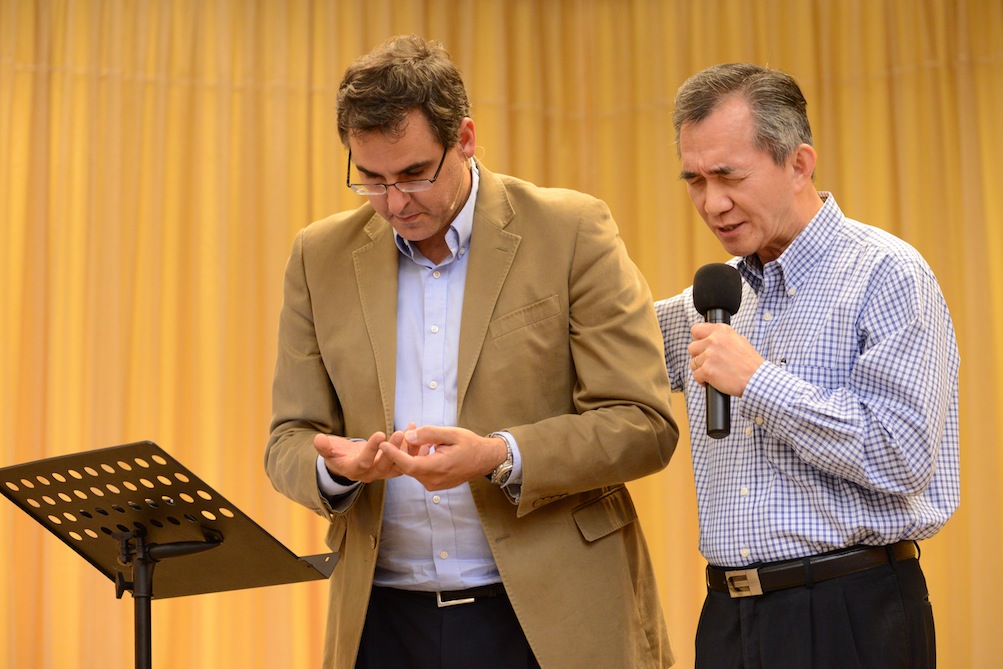
3 Oct 2013 by Adeline Lum CM-
How can a God of Love and God of Judgment coexist? That is the question answered by Michael Ramsden, apologist from the Ravi Zacharias International Ministries (RZIM) in DUMC on Sept 20.
Why is God of the New Testament different from the Old Testament?
The God of the Old Testament (OT) is often known as a God of wrath, justice, and disciplinarian, while the God of the New Testament (NT) is known as a God who is slow to anger, merciful, and loving.
So, which is the truth? The truth is that God is a God of judgment and also a God of love, which is found across the whole Bible, both in OT and NT. Hence, the solution, Ramsden shared, is to really read the WHOLE Bible!
For example, if we read through the book of Jonah in OT, we would find that Jonah described God as a God of grace, compassion, slow to anger, abounding in love, and relenting from anger (Jonah 4:2b); far from a hostile and wrathful image we have of God in OT. In fact, Jonah became extremely angry with God precisely because God was a God of love, who forgave the Ninevites for repenting.
Hence, the God of the OT and NT has no chasm of difference as we presumed, but He is consistent throughout time. Clearly, if we looked closely, the God of the Israelites in the OT is the same God we know in the NT.
How can God say that He loves us and judges us at the same time?
This is because true love only exists in the presence of judgment, not without.
For example, in Pride and Prejudice, the affluent Mr Darcy fell in love with Elizabeth Bennet. Not able to hold his emotions any longer, Mr Darcy confessed to Elizabeth with these honest and befuddling words:
“Miss Elizabeth. I have struggled in vain and I can bear it not longer… I came to Rosings with the single object of seeing you… I had to see you. I have fought against my better judgment, my family’s expectations, the inferiority of your birth by rank and circumstance. All these things I am willing to put aside and ask you to end my agony.”
After Mr Darcy made his confession, Elizabeth responded in perplex, “I don’t understand.” How could she since Mr Darcy said that he has ‘fought against his better judgment’? Should not Mr Darcy proclaim her beauty and goodness instead?
And to answer Elizabeth’s perplexity, Mr Darcy mouthed the simple words of, “I love you” because that is what true love means! True love only exists when we are fully aware of the person’s weaknesses, yet we choose to love them. That is why two persons grow deeper in love with each other in marriage because both sides knew the inferiorities of both sides, yet they still love each other. “True love only exists in the presence of judgment,” said Ramsden.
Likewise, that is how God loves us too. Despite His full awareness of our downfall, weaknesses, ugliness, and failures that lie bare before Him, God still choose to love us unconditionally.
In love, judgment must still be served

Now that we understand God’s true love for us, God still cannot deny His very nature of being just as well (Psalm 25:8). And to be just, He must judge us for our sins, whereby the consequences of our sins are death (Romans 6:23).
Romans 6:23
For the wages of sin is death, but the gift of God is eternal life in Christ Jesus our Lord.
And if we were to depend on our good works to go to Heaven, it is a losing battle because it only takes ONE SIN to break the entire law (James 2:10). It only took one sin from Adam and Eve to be out of God’s presence because God is holy; He cannot stand even one sin.
James 2:10
For whoever keeps the whole law and yet stumbles at just one point is guilty of breaking all of it.
Are we all doomed then to the eternal hell of fire then? How can a loving God judge us and resign us to that kind of fate?
The only way God can serve justice and yet save our souls is to send someone to pay the penalty for our sins. And since the penalty of sin is death, this person would need to die in our place. Hence, God sends his son Jesus Christ who has zero sins to come and die for us on the cross.
Romans 8:3-4
For what the Law could not do, weak as it was through the flesh, God did: sending His own Son in the likeness of sinful flesh and as an offering for sin, He condemned sin in the flesh, so that the requirement of the Law might be fulfilled in us, who do not walk according to the flesh, but according to the Spirit."
Having full knowledge of our impossibility to atone for our own sins, God paid the full price of our sins by sending Jesus Christ to die for us. At the cross, God fulfilled his nature of being loving and just at the same time! Only at the cross, these two contrasting natures of God can be perfectly shown in harmony.
Who can enter Heaven now then?
Since we have now understand how God is the God of Love and God of Judgment, let us find out how God decides who gets to go Heaven or Hell?
Let say you have a bookshelf, filled with books about different individuals:
- Top shelf – You have the kindest and most influential people for humanity here, i.e. Mother Teresa, Mahatma Gandhi.
- Second shelf – You will find national good-will heroes.
- Third shelf- Ordinary, honest, decent-looking people are on this shelf.
- Fourth shelf- People who live on the edge and loves risky lifestyles are placed here. They are fun to be with but are often irresponsible.
- Fifth shelf- People who lie and cheat come into this shelf.
- Sixth shelf- People we considered as genuinely ‘evil’, those who enjoy inflicting harm on other people are at the most bottom.
If you were to draw a line across to divide those who go to Heaven or Hell, where would you draw this line?
Many of us, Ramsden shared, would draw a horizontal line right below where we stand in the bookshelf. We would qualify ourselves for Heaven while the ‘bad’ people located at the bottom shelves below us would go to Hell.
How would God draw the line?
God will draw a vertical line across all the bookshelves instead, shared Ramsden, cutting through all the people whom we considered as angels of humanity right to the ‘evil’ people.
“What is promised is God knows exactly what you are like. You’re not fooling anyone. He has paid the price for you and extended His peace to you,” said Ramsden.
And such is the grace of God, which is offered to the kindest person to the most evil person we know. Although we may fold our arms and say “not fair”, the gospel of Jesus Christ is offered to every person who is willing to accept Christ as their personal savior and repent of their sins in order to gain eternal life in Heaven.
Hence, since the offer of salvation is offered without favoritism, only one question remains; shall we accept the hand of Jesus Christ that has been extended to us and admit that we are sinners before Him, or shall we pave our futile way to God? The decision lies in us.
John 3:16
For God so loved the world that he gave his one and only Son, that whoever believes in him shall not perish but have eternal life.
Note: Pictures of the Michael Ramsden event were provided by DUMC.
References for pictures:
http://thecollegepolitico.com/wp-content/uploads/2009/04/book-shelf.jpg
http://laurelblair.files.wordpress.com/2009/03/1179879_83480574.jpg











Truth has wings. God is both a God of love and justice. The problem lies with us. We all love a God whose image fits our expectation of a benevolent being. We prefer preachers who portray God as loving and forgiving, patient with our sins and deficiencies—rather than those who dwell on judgment. "Much of our difficulty as seeking Christians stems from our unwillingness to take God as He is and adjust our lives accordingly. We insist on trying to modify Him and bring Him nearer to our own image.”
You have said a mouthful. Amen